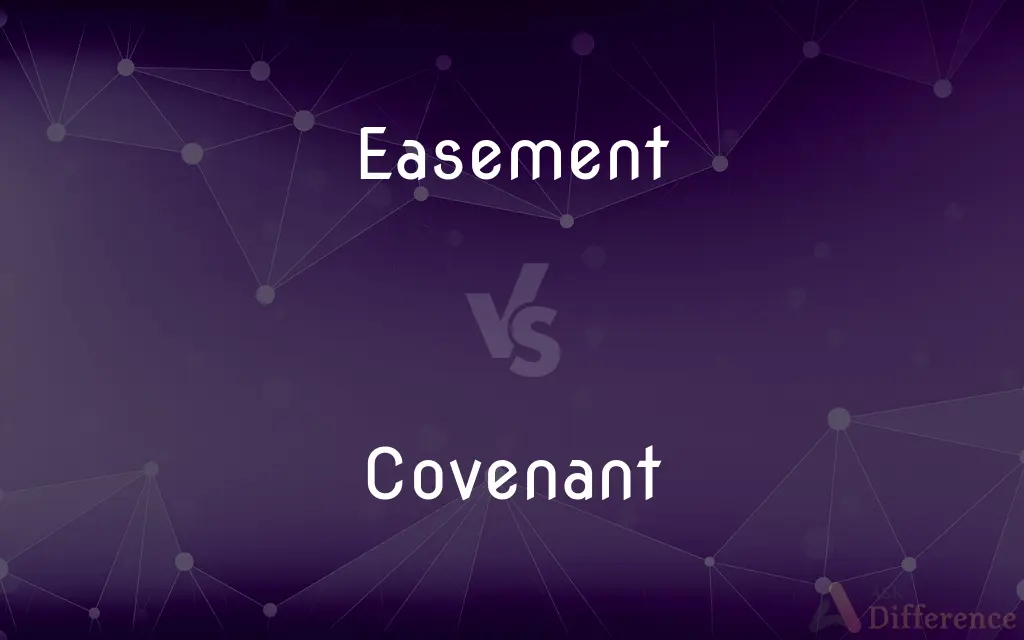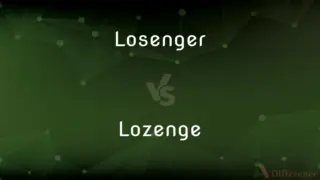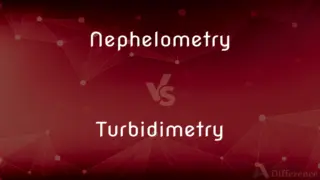Easement vs. Covenant — What's the Difference?
By Fiza Rafique & Urooj Arif — Updated on March 25, 2024
Easement involves a right to use another's land for a specific purpose, while a covenant is a formal agreement dictating land use or restrictions.

Difference Between Easement and Covenant
Table of Contents
ADVERTISEMENT
Key Differences
An easement is a non-possessory interest in another's property, granting the holder the right to use the land for a particular purpose, such as right of way or utility access, without owning it. Covenants, on the other hand, are formal agreements or restrictions written into the deed of a property, binding current and future owners to specific conditions, such as architectural standards or land use restrictions.
While easements often focus on physical use or access to land, covenants can encompass a broader range of restrictions and obligations, including how the land can be used, what structures can be built, and even maintenance standards. Easements typically benefit a neighboring landowner or a utility company, allowing for specific uses like passage or laying cables, whereas covenants can be imposed by developers, homeowners' associations, or previous owners, aiming to maintain certain standards or aesthetics in a community.
The creation of an easement usually requires a written agreement if it is not apparent or prescriptive over time, and it is often recorded with the local land records to notify future owners. Covenants are typically established in the property's deed, becoming a part of the legal title and binding on all subsequent owners.
Easements are generally more focused on utility and access, potentially enhancing the property's value by providing essential services or access rights. Covenants, while they can protect property values by maintaining uniformity and standards, might also impose limitations that some owners find restrictive.
Disputes over easements often involve the scope or extent of the use, while covenant disputes may revolve around adherence to the stipulated conditions or the reasonableness of restrictions. Both easements and covenants are enforceable by law, but their implications and the nature of disputes can differ significantly.
ADVERTISEMENT
Comparison Chart
Nature
Right to use another's land for a specific purpose.
Formal agreement dictating land use or restrictions.
Focus
Physical use or access to land.
Restrictions and obligations regarding land use and maintenance.
Beneficiaries
Often neighboring landowners or utility companies.
Can be imposed by developers, homeowners' associations, or prior owners.
Creation
Requires a written agreement, often recorded with land records.
Established in the property's deed, binding on future owners.
Disputes
Typically involve the scope of use.
Often revolve around adherence to conditions or reasonableness of restrictions.
Compare with Definitions
Easement
Right of way across a neighbor's land.
He granted an easement for a driveway to access the main road.
Covenant
Restriction on property alterations.
The covenant prohibited building structures over two stories tall.
Easement
Utility easement for infrastructure.
The city has an easement to lay water pipes across private properties.
Covenant
Maintenance standards for a community.
Homeowners' association covenants required regular lawn maintenance.
Easement
Can enhance property value.
Access easement to the lake increased the property's attractiveness.
Covenant
Binding on all future property owners.
Despite selling the property, the covenant's conditions remained in effect for the new owner.
Easement
Non-possessory interest in land.
The easement allowed her to walk through the property, but she couldn't build on it.
Covenant
Disputes often about adherence to conditions.
She faced penalties for violating the landscaping covenant.
Easement
Scope of use is often a contention point.
Disputes arose over whether the easement included vehicular access.
Covenant
Can be protective or restrictive.
A covenant ensured that all houses in the neighborhood maintained a historical aesthetic.
Easement
An easement is a nonpossessory right to use and/or enter onto the real property of another without possessing it. It is "best typified in the right of way which one landowner, A, may enjoy over the land of another, B".
Covenant
A binding agreement; a compact.
Easement
The act of easing or the condition of being eased.
Covenant
A condition in a contract such as a deed or lease, nonperformance or violation of which gives rise to a cause of action for breach.
Easement
Something that affords ease or comfort.
Covenant
A contract.
Easement
(Law) A right to make limited use of another's land, such as a right of way.
Covenant
In the Bible, a divine promise establishing or modifying God's relationship to humanity or to a particular group.
Easement
(law) An interest in land which grants the legal right to use another person's real property (real estate), generally in order to cross a part of the property or to gain access to something on the property (right of way).
The power company has an easement to put their electricity poles along the edge of this land.
Covenant
One of the agreements supported by a Covenanter.
Easement
(architecture) An element such as a baseboard, handrail, etc., that is curved instead of abruptly changing direction.
Covenant
To promise by a covenant.
Easement
(archaic) Easing; relief; assistance; support.
Covenant
To enter into a covenant.
Easement
The act of relieving oneself: defecating or urinating.
Covenant
(legal) An agreement to do or not do a particular thing.
Easement
(model railroading) Transition spiral curve track between a straight or tangent track and a circular curved track of a certain radius or selected radius.
Covenant
(legal) A promise, incidental to a deed or contract, either express or implied.
Easement
Gratification. en
Covenant
A pact or binding agreement between two or more parties.
Easement
That which gives ease, relief, or assistance; convenience; accommodation.
In need of every kind of relief and easement.
Covenant
An incidental clause in an agreement.
Easement
A liberty, privilege, or advantage, which one proprietor has in the estate of another proprietor, distinct from the ownership of the soil, as a way, water course, etc. It is a species of what the civil law calls servitude.
Covenant
To enter into, or promise something by, a covenant.
Easement
A curved member instead of an abrupt change of direction, as in a baseboard, hand rail, etc.
Covenant
(legal) To enter a formal agreement.
Easement
(law) the privilege of using something that is not your own (as using another's land as a right of way to your own land)
Covenant
(legal) To bind oneself in contract.
Easement
The act of reducing something unpleasant (as pain or annoyance);
He asked the nurse for relief from the constant pain
Covenant
(legal) To make a stipulation.
Covenant
A mutual agreement of two or more persons or parties, or one of the stipulations in such an agreement.
Then Jonathan and David made a covenant.
Let there be covenants drawn between us.
If we conclude a peace,It shall be with such strict and severe covenantsAs little shall the Frenchmen gain thereby.
Covenant
An agreement made by the Scottish Parliament in 1638, and by the English Parliament in 1643, to preserve the reformed religion in Scotland, and to extirpate popery and prelacy; - usually called the "Solemn League and Covenant."
He [Wharton] was born in the days of the Covenant, and was the heir of a covenanted house.
Covenant
The promises of God as revealed in the Scriptures, conditioned on certain terms on the part of man, as obedience, repentance, faith, etc.
I will establish my covenant between me and thee and thy seed after thee in their generations for an everlasting covenant, to be a God unto thee, and to thy seed after thee.
Covenant
A solemn compact between members of a church to maintain its faith, discipline, etc.
Covenant
An undertaking, on sufficient consideration, in writing and under seal, to do or to refrain from some act or thing; a contract; a stipulation; also, the document or writing containing the terms of agreement.
Covenant
To agree (with); to enter into a formal agreement; to bind one's self by contract; to make a stipulation.
Jupiter covenanted with him, that it should be hot or cold, wet or dry, . . . as the tenant should direct.
And they covenanted with him for thyrty pieces of silver.
Covenant
To grant or promise by covenant.
My covenant of peace that I covenanted with you.
Covenant
A signed written agreement between two or more parties (nations) to perform some action
Covenant
(Bible) an agreement between God and his people in which God makes certain promises and requires certain behavior from them in return
Covenant
Enter into a covenenant
Covenant
Enter into a covenant or formal agreement;
They covenanted with Judas for 30 pieces of silver
The nations covenanted to fight terrorism around the world
Common Curiosities
What is an easement in property terms?
An easement is a non-possessory right to use another person's land for a specific purpose, such as access or utility lines.
How is an easement created?
An easement is typically created through a written agreement between the property owner and the easement holder and is often recorded with local land records.
How does a covenant affect property use?
A covenant is a formal agreement that imposes restrictions or obligations on how a property can be used, affecting current and future owners.
Can an easement be revoked?
Easements can be revoked or terminated under certain conditions, such as if the purpose for the easement no longer exists or by mutual agreement.
How can a covenant be removed or changed?
Removing or changing a covenant usually requires a legal process, which might involve agreement from affected parties or a ruling from a court.
What is the difference between an easement and a right of way?
A right of way is a type of easement specifically granting the holder the right to pass through another's land.
Are covenants legally enforceable?
Yes, covenants are legally enforceable agreements that bind current and future property owners to specific conditions or restrictions.
Can easements affect property value?
Easements can affect property value both positively and negatively, depending on their nature and the perceived benefit or limitation they impose.
Are there easements that don't require written agreements?
Some easements, like prescriptive easements, can be established through long-term use, but most require formal agreements to be legally recognized.
How do covenants benefit a community?
Covenants can benefit a community by maintaining standards and uniformity, potentially enhancing the overall appeal and property values.
What role do homeowners' associations play in enforcing covenants?
Homeowners' associations often play a significant role in enforcing covenants, ensuring compliance with community standards and restrictions.
What types of covenants can be placed on a property?
Covenants can range from architectural controls, land use restrictions, to maintenance requirements, depending on the intent of the developer or community.
What happens if an easement is violated?
Violating an easement can lead to legal disputes and potential penalties, including injunctions to cease the violation or damages.
Can a new owner change a covenant?
A new owner can seek to change a covenant, but this usually requires agreement from other affected parties or legal intervention.
How are disputes over easements resolved?
Disputes over easements are typically resolved through negotiation, mediation, or, if necessary, legal action to enforce or clarify the easement terms.
Share Your Discovery

Previous Comparison
Losenger vs. Lozenge
Next Comparison
Nephelometry vs. TurbidimetryAuthor Spotlight
Written by
Fiza RafiqueFiza Rafique is a skilled content writer at AskDifference.com, where she meticulously refines and enhances written pieces. Drawing from her vast editorial expertise, Fiza ensures clarity, accuracy, and precision in every article. Passionate about language, she continually seeks to elevate the quality of content for readers worldwide.
Co-written by
Urooj ArifUrooj is a skilled content writer at Ask Difference, known for her exceptional ability to simplify complex topics into engaging and informative content. With a passion for research and a flair for clear, concise writing, she consistently delivers articles that resonate with our diverse audience.
















































